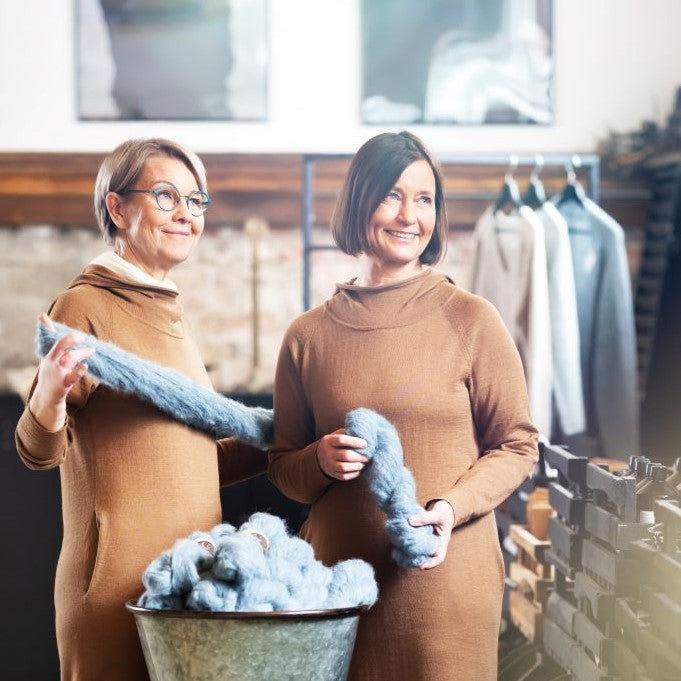Responsibility report 2024 (Infine Oy)
Transparent responsibility in the Alpaca Royal collection
Country of origin of materials: Peru
Country of manufacture: Finland, Lithuania
Certificates from the value chain: Responsible Alpaca standard, Fair trade, USDA organic
Ruukki's alpaca products are natural, undyed and not treated with chemicals. The products are designed and manufactured in Finland as our own production, made by domestic partners and some in Lithuania, because they cannot be manufactured in Finland for technical reasons. The design aims to ensure that the clothes have as long a life cycle as possible. They are designed to be timeless, versatile and stylish, and to last for a long time.
Together with the sustainability technology company Infine, Ruukki's spinning mill carried out a comprehensive sustainability analysis for its Alpaca Royal collection, the aim of which was to shed light on the product's journey through the entire value chain. The result is an overall picture of the responsibility of alpaca products. We gathered together ten factors of responsibility from Alpaca Royal's value chain. By shedding light on the value chain, an example is also shown for the responsibility of the clothing industry.
We will first highlight the factors by which the responsibility of Alpaca Royal products rises to a higher level than its counterparts. Then we go through the risks at the core of the responsibility work. However, transparency is an important factor in Alpaca Royal's production, so that no point remains unclear to the consumer.
1. Responsible procurement of material
The alpaca wool in the collection is durable, undyed and not treated with chemicals. The wool comes from Peru, and its production chain follows the Responsible Alpaca standard. This guarantees both ethical and sustainable production methods for animal welfare. Alpaca wool is naturally recyclable and reusable.
2. Minimization of losses
Ruukki's Kehräämö accepts products that are at the end of their life cycle and processes them into new material. This approach reduces waste and consumption of non-renewable natural resources. The products are also knitted to their shape, so there is no waste.
3. Maintenance service and lifetime warranty
Repairing the product and extending its life cycle have been made easy with our own after-sales service. Extending the product's life cycle keeps the resources used to manufacture it in circulation for a longer time, thus reducing the need to use new resources. The products have a lifetime warranty.
Liability risks with Alpaca Royal products.
Although the product has third-party certificates, the country of origin also has its own risks, which can be minimized with certificates, but cannot be completely eliminated. Therefore, being aware of these risks is part of responsibility.
1. Corruption and human rights situation in the country of origin
Alpaca wool comes from Peru, on the other side of the world. When operating in Peru, special attention must be paid to the human rights situation and possible other risks, such as corruption. For example, the Corruption Perception Index, which measures the level of corruption in different countries, estimates the risk of corruption to be significant in Peru.
The situation can be improved with third-party certifications and audits. Alpaca Royal products have the Responsible Alpaca certificate, which guarantees the breeders good conditions for making a living and raising alpacas. The producer thus supports the way of raising alpacas used as a livelihood by indigenous peoples.
2. Optimizing water use in the country of origin.
The availability of clean water is a global responsibility problem and in Peru, the country of origin of the alpaca, clean fresh water is scarce. Alpaca wool always involves some use of water, and optimizing water use and proper processing and recycling will increase operating conditions in the future as well.
At the same time, however, alpaca wool reduces water consumption, because alpaca wool is not dyed anywhere. All colors come from the alpaca's own colors, which significantly reduces the use of water.
Performance of the responsibility assessment
The responsibility assessment for Ruukin Kehräämö was carried out by: InfineInsight . The independent accountability panel consists of leading experts who ensure the reliability of Infine Insight's data collection and rules.
The use of a third party in the responsibility assessment means that an independent third party sets the goals and monitors their implementation. This ensures that, in addition to the producer's supervision, a third party supervises the operation and acts as a kind of certifier that the operation of the value chain complies with the requirements.


